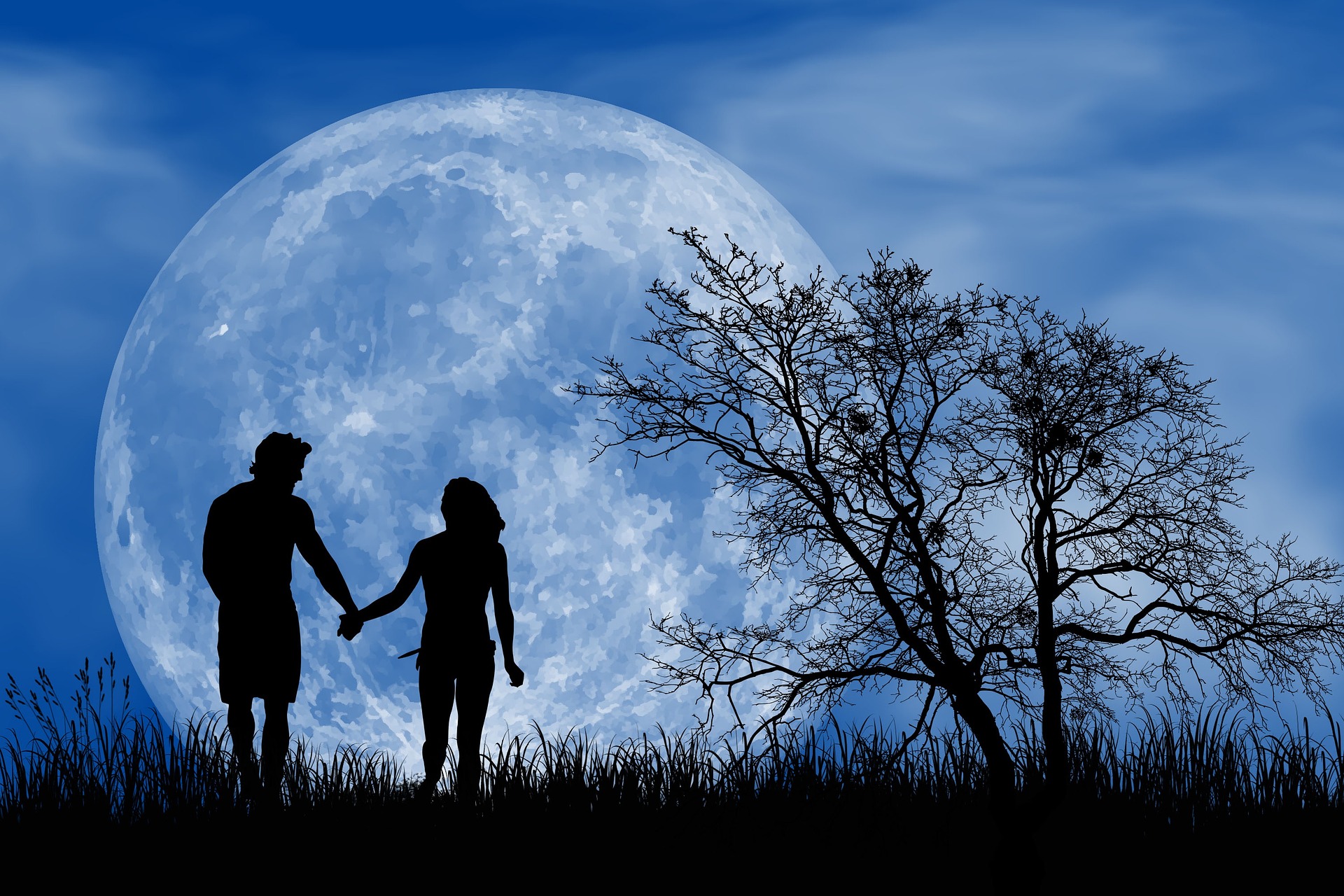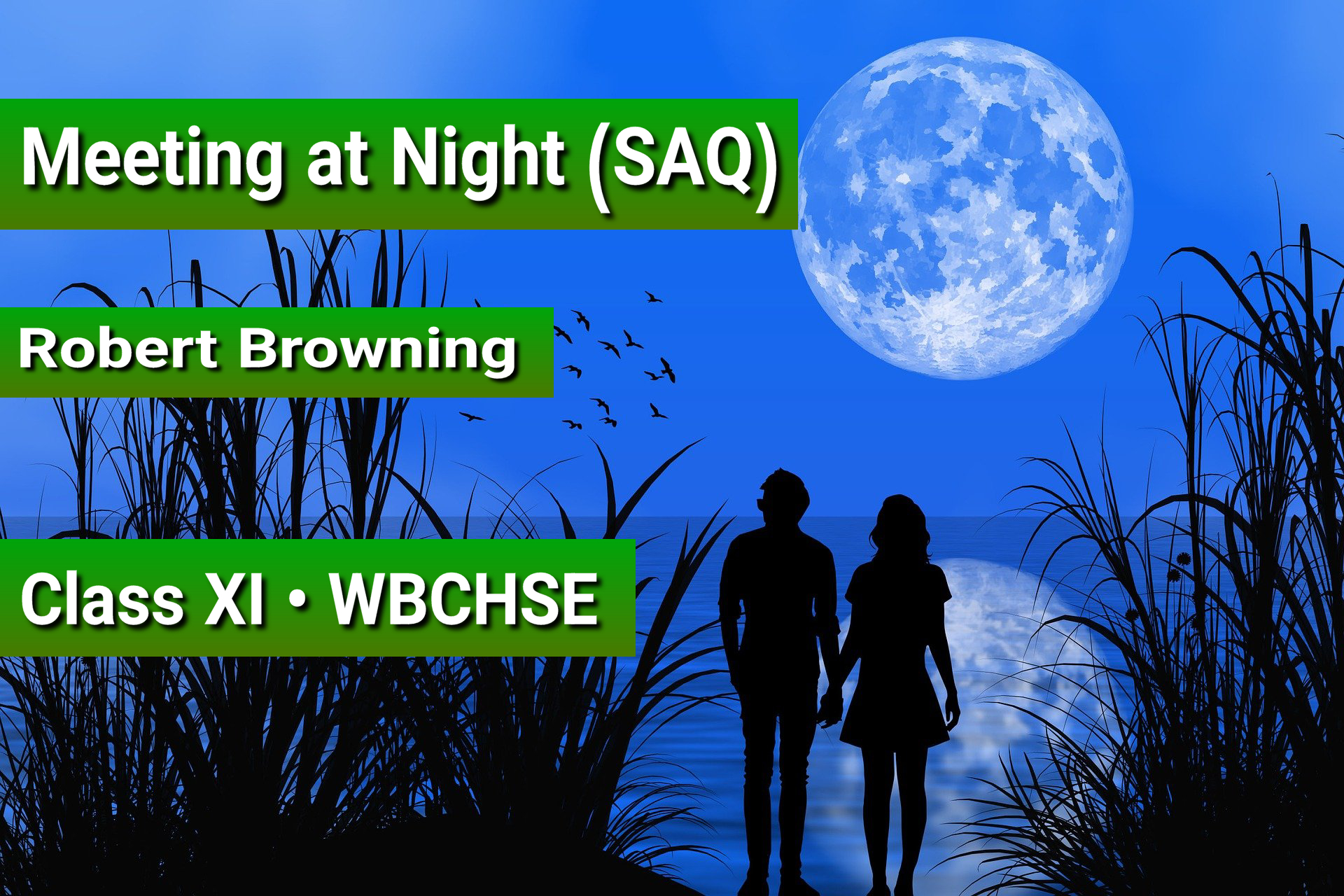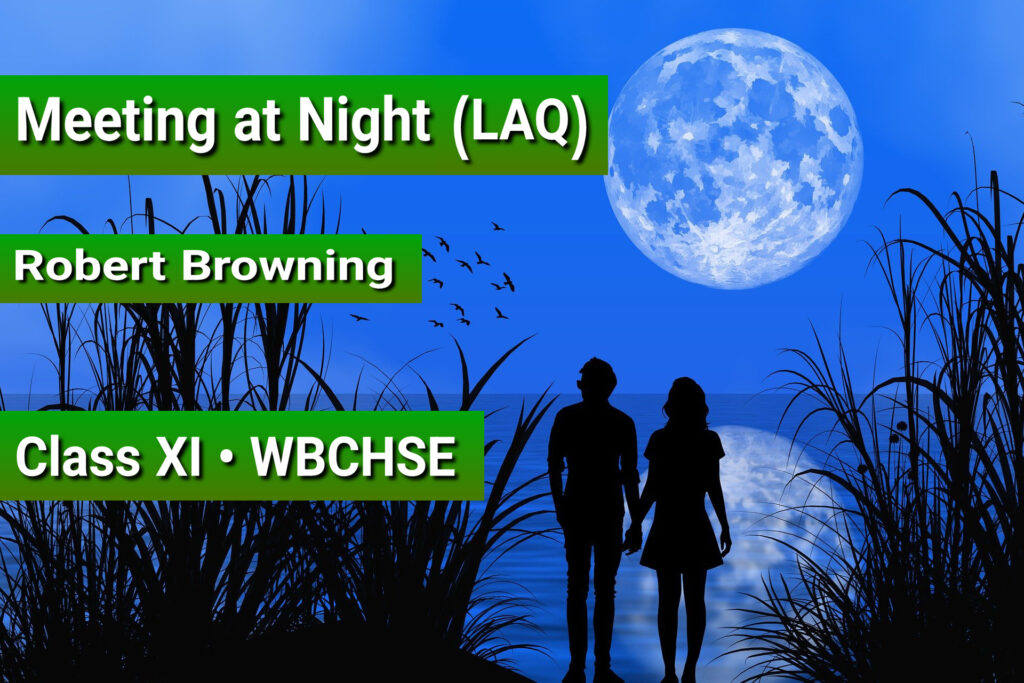Important short questions and answers from Meeting at Night by Robert Browning.

Meeting at Night SAQ, Class 11
1.What is the colour of the sea in ‘Meeting at night’? ( XI – ’18, ’15)
Ans: In ‘Meeting at night’ the colour of the sea is grey.
2. Whose voice responds to the tap at the pane? ( XI – ’19)
Ans: The beloved’s voice responds to the tap at the pane.
3. How many fields will the poet have to cross before a farm appears? ( XI – ’19 ,’14, ’23)
Ans: The poet will have to cross three fields before a farm appears.
4. What does the speaker do immediately after he reaches the house in ‘Meeting at Night’? (XI – ’16)
Ans: The speaker immediately gives a tap at the windowpane of his beloved’s house after he reaches the house.
5. Where does the boat slow down? (XI – ’16)
Ans: The boat slows down in the slushy sand.
6. How long is the “Sea-scented beach”? (XI- ’14, ’20)
Ans: The ‘Sea-scented’ beach is a mile long.
7. How does Browning describe the half-moon? (XI – ’15, ’18, ’20, ’23)
Ans: Browning describes the half-moon as yellow, large and low.
8. What does the image ‘fiery ringlets’ suggest? (XI – ’19)
Ans: The ‘fiery ringlets’ suggests the burning passion of love of the speaker.
9. Who is the speaker in the poem?
Ans: In the poem Meeting at Night, the speaker is an unknown lover who wants to meet his ladylove secretly at night.
10. Where is the speaker heading towards?
Ans: The speaker is heading towards the black land to meet his ladylove.
11. When does the lover make his journey?
Ans: The lover makes his journey at night.
12. How does Browning describes the land as long and black?
Ans: In ‘Meeting at Night’ Browning describes the land as long and black.
13. What does ‘slushy sand’ mean?
Ans: The phrase ‘Slushy sand’ means the soft and muddy sand.
14. What makes the speaker stop his boat?
Ans: The speaker stops his boat at the bay as it reaches the slushy sand.
15. What do the ‘ startled little waves’ do after being waken up from their sleep?
Ans: The ‘startled little waves’ leap up and from fiery ringlets after being woken up from their sleep.
16. What does the poet mean by the expression ‘ quench its speed’?
Ans : The expression ‘ quench its speed’ means the speaker slow down the boat as it reaches the bay.
17. What does ‘the grey sea’ suggest?
Ans: In the poem Meeting at Night the phrase ‘the grey sea’ suggests the evening and it also suggests the lover’s secret journey to meet his ladylove.
18. Why does the speaker give a tap at the pane?
Ans: The speaker gives a tap at the pane to announce his arrival.
19. Why is the voice of lady ‘less loud’?
Ans: The voice of lady ‘less loud’ because they wants to meet secretly and do not want to be discover and the secret meeting makes them so excited that the sound of the beating if the heats of the two lovers seems to be louder than the whisper of the beloved.
20. How does the lover feel after meeting his beloved?
Ans: After meeting his beloved the lover feels the supreme enjoyment in the reunion.
21. Where does the blue spurt come from?
Ans: The blue spurt comes from inside the beloved’s room.
22. What type of poem is, ‘Meeting at Night’?
Ans: The poem is a love lyric.
23. What is the smell of the beach?
Ans: The beach exudes the smell of the sea.
24. Where does the lover’s boat stop?
Ans: The lover’s boat stops at the shore as it hits the slushy sand.
25. How is the moon when the lover starts his journey?
Ans: When the lover starts his journey, the moon is half in size and looks yellow, large and low.
26. How is the voice of the lady?
Ans: The voice of the lady is very low.
27. Where do the two lovers meet?
Ans: The two lovers meet in the beloved’s farmhouse across the bay.
28. Where does the beloved live?
Ans: The beloved in Browning’s poem ‘Meeting at Night’ lives in a farmhouse across the bay.
29. Who wrote the poem, ‘Meeting at Night’?
Ans: Robert Browning wrote the poem, ‘Meeting at Night’.
30. What does the ‘fiery ringlets’ stand for?
Ans: The phrase ‘firey ringlets’ stand for the warm passion of love in the heart of the speaker.
31. “I gain the cove” – What does this expression from “Meeting at Night” mean?
Ans: The expression suggests that the speaker reached a sheltered place of the shore.
32. What reply does the beloved give to the lover’s tap at the pane?
Ans: The beloved responds by lightning a match within.
33. What does the ‘blue sprout’ symbolise in the poem?
Ans: In the poem, blue spurt symbolises the ignition of lovers’ passion.
34. What is louder than the voice in ‘Meeting at Night’?
Ans: The sound of the beating of the hearts of the two lovers seems to be louder than the voice in ‘Meeting at Night’.
35. Why do the lovers meet at night?
Ans: In the poem ‘Meeting at Night’, the lovers want to meet at night because they do not want to be discovered.
36. What is the name of the companion poem of the poem ‘Meeting at Night’?
Ans: ‘Parting at Morning’ is the name of the companion poem of the poem ‘Meeting at Night’.
37. What does the stanza two focus on in the poem ‘Meeting at Night’?
Ans: The second stanza focuses the anticipation and the fulfilment of the secret meeting.
38. How many stages are there in the journey of the lover?
Ans: There are three stages in the journey of the lover .
39. How are the waves personified by the poet in the poem ‘Meeting at Night’?
Ans: In the poem, ‘Meeting at Night’ the poet personify the waves by describing them as startled.
40. How do the little waves leap from their sleep? (XI – ’23)
Ans: The little waves leap from their sleep like fiery ringlets.


